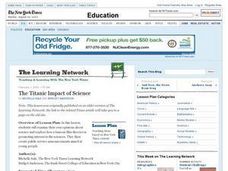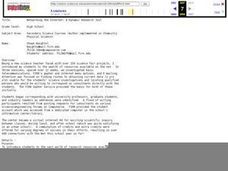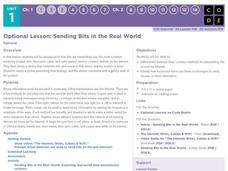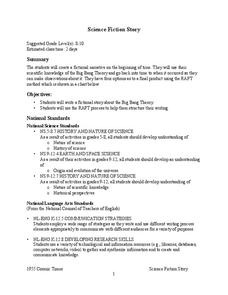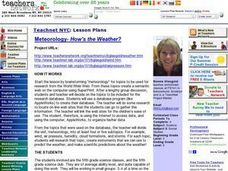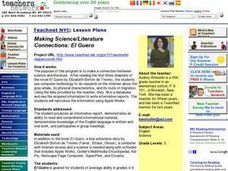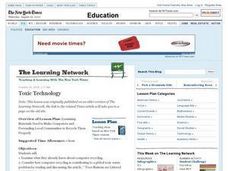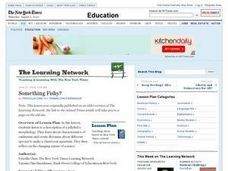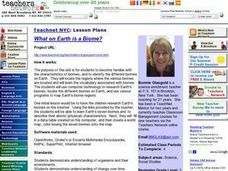Curated OER
Space and Science Fiction
Use the Franklin Institute's exhibition "An Inquirer's Guide to the Universe" to have students research ideas for a science fiction story. After completing their research, writers will compose science fiction stories that incorporate...
Curated OER
The Titanic Impact of Science
Discuss personal ideas about science and how a filmmaker can employ the arts to promote science. After reading an article, young scientists will discover how James Cameron is trying to interest people in the oceans. In groups, they will...
Curated OER
Playing With Science
Young scientists investigate the scientific concepts and principles that help make common toys such as hula hoops, yo-yos, slinkies, and silly putty work. As a class, they read "Backyard Rocket Science, Served Wet" to get a look behind...
Curated OER
Networking the Internet: A Dynamic Research Tool
Learners engage in a lesson that is concerned with the research of finding information to help them develop new science projects. They conduct research using a variety of resources that includes e-mail and discussion groups.
Curated OER
Science on the Skids
Students discuss the decline in the sciences in America by comparing statistics and information from the U.s. to other countries. Then they write and deliver a "State of the Sciences" address to their peers.
Curated OER
Pen Pals
Learners make their own predictions about the amount of different types of birds at each site before they go there. In groups, they collect the bird data and compose letters to their pen pals sharing their information. To end the lesson,...
Code.org
Sending Bits in the Real World
A bit optional. How do computers transmit in the real world? Pupils research a device that is used in transmitting bits, then individuals create a poster that presents the information they have learned about their device.
NASA
Science Fiction Story
A lesson allows you to go back in time and see the big bang actually happen. Bazinga! In reality, pupils research the Big Bang Theory and theorize what it would be like to go back in time and see it happen. There are four...
Curated OER
Hic-Hic-Hooray!
What is really the best way to get rid of hiccups? Investigate some old wives' tales and folk remedies related to health. Middle schoolers explore the science behind why people might believe these myths to be true and find the real...
Curated OER
E.T., Are You Out There?
Research the necessary components of a planet that supports life after reading the article "All of a Sudden, The Neighborhood Looks a Lot Friendlier" from The New York Times. After finding their information, middle and high schoolers...
Curated OER
Sunrise-Sunset
Students gather data, make and share predictions about the time of sunrise ans sunset in their area. Patterns are analyzed and shared with students from other areas.
Curated OER
The "Science" of Racism
How can we keep racism out of our society? Analyze the factors that lead to racism today and research previous scientific findings that impacted social policy. Your high school young scholars identify ways to prevent past mistakes from...
Curated OER
Science: How's the Weather?
Fifth graders brainstorm meteorological terms to create a semantic web using SuperPrint. For each topic, they create instruments, such as barometers or psychomotors, that they use to make scientific predictions about the weather. After...
Curated OER
A New You!
Science learners journal familiar ways that the human body can regenerate or heal itself. In small groups, they research and create a poster of current information on stems cells and how they can be used to regenerate. The article for...
Curated OER
Discover the World of Machines
Students participate in a project which incorporates science with reading, writing, social studies, and technology. Through several activities over a 15 day period, they explore the computer, digital camera, computer software programs...
Curated OER
Making Science and Literature Connections
Learners access the Internet and research physical characteristics and route of migration of the gray whale. They complete a database and reproduce the information using Apple Works. They read the novel El Guero by Elizabeth Borton de...
Curated OER
TOXIC TECHNOLOGY
Students examine what they already know about computer recycling and cconsider how computer recycling is contributing to a global toxic waste problem by reading and discussing the article, ""Poor Nations are Littered With Old PC's,...
Curated OER
The Book of Life
Students discuss the factors that make a good children's book. After reading an article, they explore the prevalence of science in children's literature. In groups, they research a topic and translate it into easy language for a child...
Curated OER
Nature, Red in Tooth and Claw
Students explore the science and art of taxidermy, and research various biomes that could be depicted in museum displays. They synthesize their knowledge by creating dioramas that depict the diverse life forms typical of these biomes.
Curated OER
Something Fishy?
Students try to draw and identify a jellyfish from a physical description. After reading an article, they discover new information about cnidarians. In groups, they research and develop dioramas about a specific cnidarian species. They...
Curated OER
Butterfly Adventure
Students in second grade are paired with fifth grade computer research buddies. They observe the characteristics of caterpillars, and identify the four stages of the caterpillar to butterfly life cycle. They graph the number of...
Curated OER
What on Earth is a Biome?
Students explore organisms and their environments. They examine change over time
demonstrate an understanding of physical positions on Earth. They survey earth's diversity, write a report, fill in a data table created on the...
Curated OER
The Cay: Creatures of the Coral Reef
Young scholars make a connection between science and literature. After reading the first five chapters of the novel The Cay, they describe the physical characteristics of a coral reef, as well as describe and distinguish between the...
Curated OER
Is That a Fact?
Investigate popular scientific claims and gather evidence to defend or argue against an author's stance. Writers synthesize information and compose their own "Really?" columns modeled after those found in the weekly "Science Times"...

